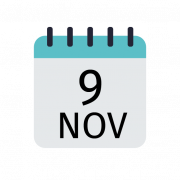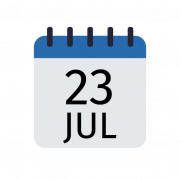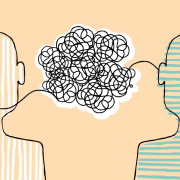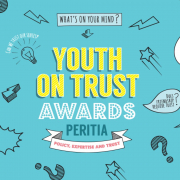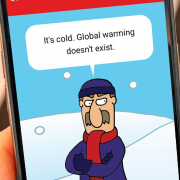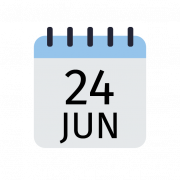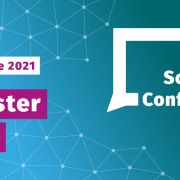Future of Science Communication Conference: Moving Forward Research & Practice
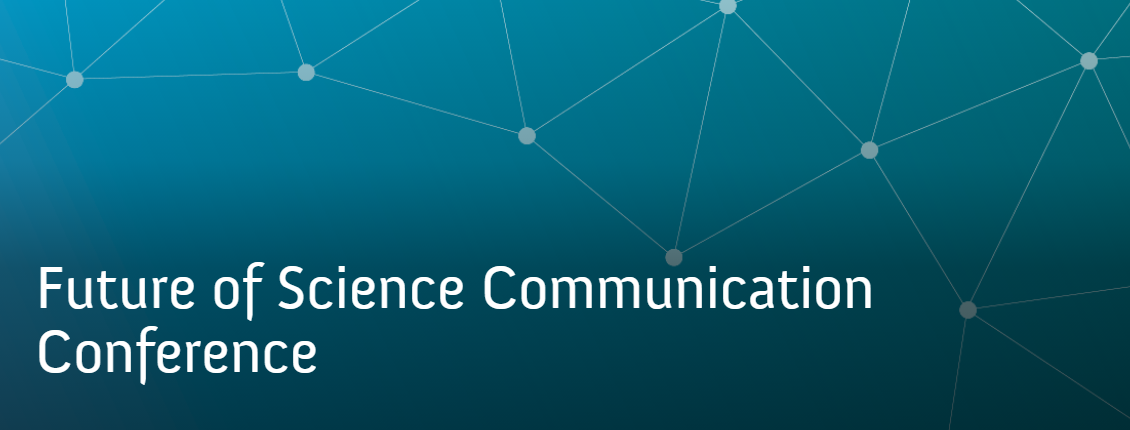
How can we connect research and practice in the science communication field? How can science communication help make science more trustworthy? What lessons have we learned on the relationship between science and politics during the Covid-19 pandemic? Over 1000 participants joined two days of digital discussions and workshops to tackle these and more questions at the Future of Science Communication Conference.
After a year of planning and curating, the event took place in digital format on 24-25 June, co-organised by ALLEA and Wissenschaft im Dialog, the organisation for science communication in Germany and funded by the German Federal Ministry of Education and Research within the scope of Germany’s Presidency of the Council of the European Union.
The international conference brought together actors from research and practice of science communication. Its goal was to sensitise the various stakeholders from science, science communication and politics to the respective challenges and to provide an impetus for stronger networking and transfer between the ‘science of science communication’ and European practitioner communities.
Attendees could enjoy three keynotes and six panels, participate in ten workshops and attend three lightning talk sessions, a poster session and a matching session. All sessions were related to one of five topics: Science & Politics, Trust in Science, Target Groups of Science Communication, Open Science & Citizen Science, and Fake News & Disinformation.
“We are at a Fork in the Road moment in science communication.” – Mike Schäfer (University of Zurich)
From Science Communication to Trust in Science
Day one started with welcoming words from Thomas Rachel MdB (Parliamentary State Secretary at the German Federal Ministry of Education and Research) and the ALLEA President Antonio Loprieno, before featuring two keynotes by Mike Schäfer (University of Zurich) and the Chief Scientific Advisor to the European Commission Nicole Grobert (University of Oxford), who shared input from their scientific and political perspectives.
Schäfer presented an overall analysis of the science communication field with three main questions: how can we move forward, what is going well, what is not going so well. His take-home message was to recognise that science communication is in a “Fork in the Road” moment. Institutions, scientists and communicators should work together to push forward and scale up the synergies between practice and research. For instance, he proposed to increase “inreach” into science: motivate, train, support, valorize and sensitize scientists for societal demands.
The Chief Scientific Advisor Nicole Grobert added a science advice perspective to the discussion and provided insights on how to communicate emergency and strategic science advice. Particularly, she suggested to follow four key questions when communicating science advice for policy:
- What we know
- What we don’t know
- What is uncertain
- What cannot be known
The discussions continued in the afternoon with the panel “Trust in Science: nurtured, built or earned?”, moderated by Dr. Birte Fähnrich (Berlin-Brandenburg Academy of Sciences/Zeppelin University) and with speakers Rainer Bromme (University of Münster), Maria Baghramian (University College Dublin/PERITIA), John Besley (Michigan State University) and Tracey Brown (Sense About Science).
The debate focussed on how to create a concept of trust in science useful for science communication. Speakers debated how to frame such debate for practical approaches, from focusing on the causes of distrust to understand the importance of trustworthiness in science. Their advice to the science communicators was:
- Make the right questions about science (Brown).
- Talk about your honesty, good intentions, competence (Besley).
- Explain the process of science (Baghramian).
- Foster epistemic trust (Broome).
“The infodemic in fact preceded the Covid-19 pandemic by many years” – Cissi Askwall (VA Public & Science)
Are we living an “infodemic”?
The second day was kicked off by our third keynote speaker, Cissi Askwall, sharing her perspectives from science communication practice, who argued that the “infodemic in fact preceded the Covid-19 pandemic by many years”.
Friday’s first panel “Fake News & Disinformation: A pandemic of its own?” developed further this question. The debate featured Natali Helberger (University of Amsterdam), Dan Larhammar (ALLEA/Royal Swedish Academy) and Philipp Lorenz-Spreen (Max Planck Institute for Human Development) and was moderated by journalist Kai Kupferschmidt. Panellists discussed digital media literacy and the importance of including schools in the debate on fake news. Lorenz-Spreen added: “We cannot rely on the idea that with the next generation and digital natives problems with fake news will disappear. We can see even university students today can be victims of fake news.”
In a pre-recorded impulse video, Dietram A. Scheufele (University of Wisconsin-Madison) challenged common wisdom on the relevance of disinformation in today’s science communication debates: “There is very limited social scientific evidence, if any, to suggest that misinformation directly connects to more pro-social behaviours, for instance, physical distancing or getting vaccines when available”. The moderator Kupferschmidt provided additional thought-provoking ideas and key takeaways on a Twitter thread:
I‘ve spent a lot of time in recent months thinking and talking about what is broken in our information ecosystem.
Yesterday I had the pleasure to moderate a debate about misinformation and the pandemic with @nhelberger, @DanLarhammar, @philipplenz6 and (pre-recorded) @scheufele.— Kai Kupferschmidt (@kakape) June 26, 2021
Friday also featured a panel discussion on science and politics moderated by ALLEA President Antonio Loprieno. The panel included Prof. Dr. Antje Boetius (Alfred Wegener Institute), Dr. Janusz Bujnicki (International Institute of Molecular and Cell Biology in Warsaw), Prof. Dr. Ortwin Renn (Institute for Advanced Sustainability Studies Potsdam) and Dr. Bella Starling (Vocal / Wellcome Engagement Fellow / Manchester University NHS Foundation Trust). A key question that centred the debate was: What do policymakers want from scientists? Ortwin Renn had some suggestions:
What do policymakers want from scientists? O. Rehn says:
– Englightement: be informed!
– Instrumental knowledge: what are the consequences of
policy options?
– Strategic advice: how can reach certain objective?
– Monitoring
– Co-create: sit together to frame problems.#FSCC21 pic.twitter.com/rMo9eI2dKM— ALLEA (@ALLEA_academies) June 25, 2021
In the final panel discussion, panellists touched on the question whether there is a gap between research and practice in science communication. Brian Trench (Dublin City University/PCST Network) asked whether instead we are overstressing this disconnection between the science of science communication and science communication practice. He also presented his manifesto for a future of science communication that is authentic, engaged, open, surprising, uncertain, ethical, inclusive, unfinished and interpreting.
“Science Communication is about interpreting the meaning of science for people” – Brian Trench (Dublin City University/PCST Network)
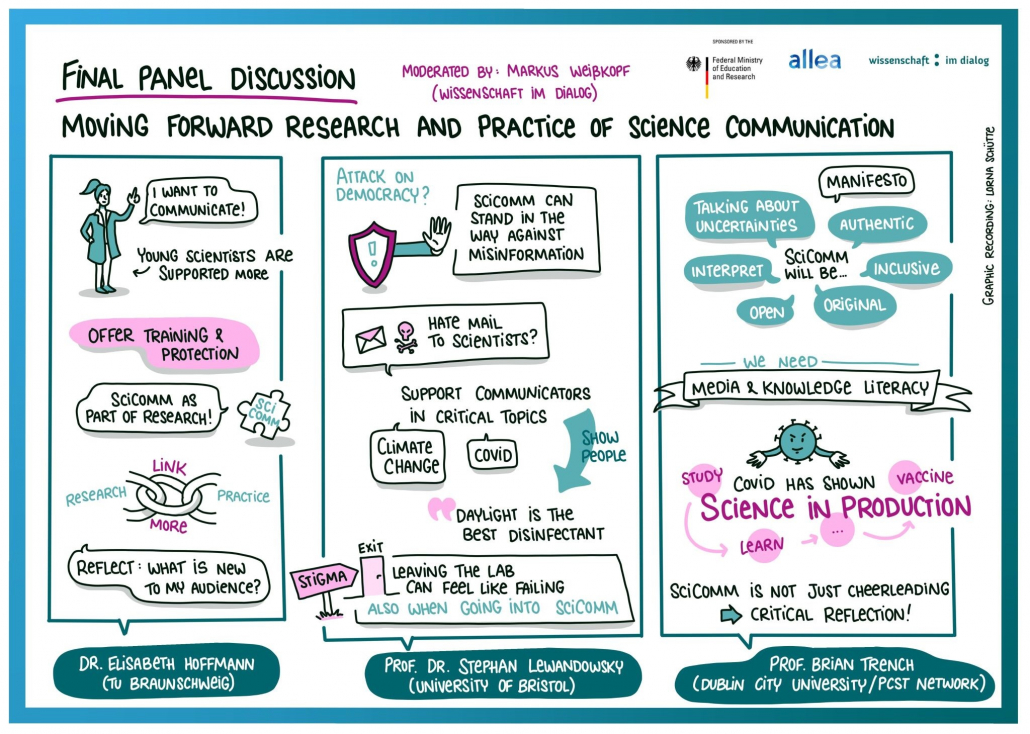
SAPEA and PERITIA workshops
Two ALLEA projects also found space in the programme. The workshop “Communicating microplastics risk: Balancing sensation and reflection” was hosted by SAPEA and featured Bart Koelmans (University of Wageningen), Sabine Pahl (University of Vienna), Lesley Henderson (Brunel University) and Toby Wardman (Science Advice for Policy by European Academies).
Additionally, our PERITIA colleagues organized two workshops, “Trust in science in social surveys: challenges, measurement and case studies” and “Using experiments to fight science disinformation online: an evidence-based guide”. The first workshop provided an overview on the nuances and complexity of measuring trust in science across countries and different contexts.
Many of you might have crossed paths with @LornaSchuette during the conference. She is covering parts of the #FSCC21 with graphic recordings. You will find them in our highlight documentation afterwards but here is a little sneak peak from one of the workshops. pic.twitter.com/gfY2ibsARu
— wissimdialog (@wissimdialog) June 25, 2021
The second workshop led by Carlo Martini (PERITIA) offered an overview on strategies to tackle disinformation attempts with the use of attention and monetary incentives interventions on social media. The contribution of John Cook (Monash University) brought additional perspectives on the use of gamification to foster critical thinking. Read more about this on our interview with him at the ALLEA Digital Salon.
For further reading on the contents of the conference, you can find the summaries of Day 1 and Day 2 published at the German science communication portal Wissenschaftskommunition. More documentation will be published in the coming months. If you want to receive future updates, subscribe to the ALLEA newsletter.

